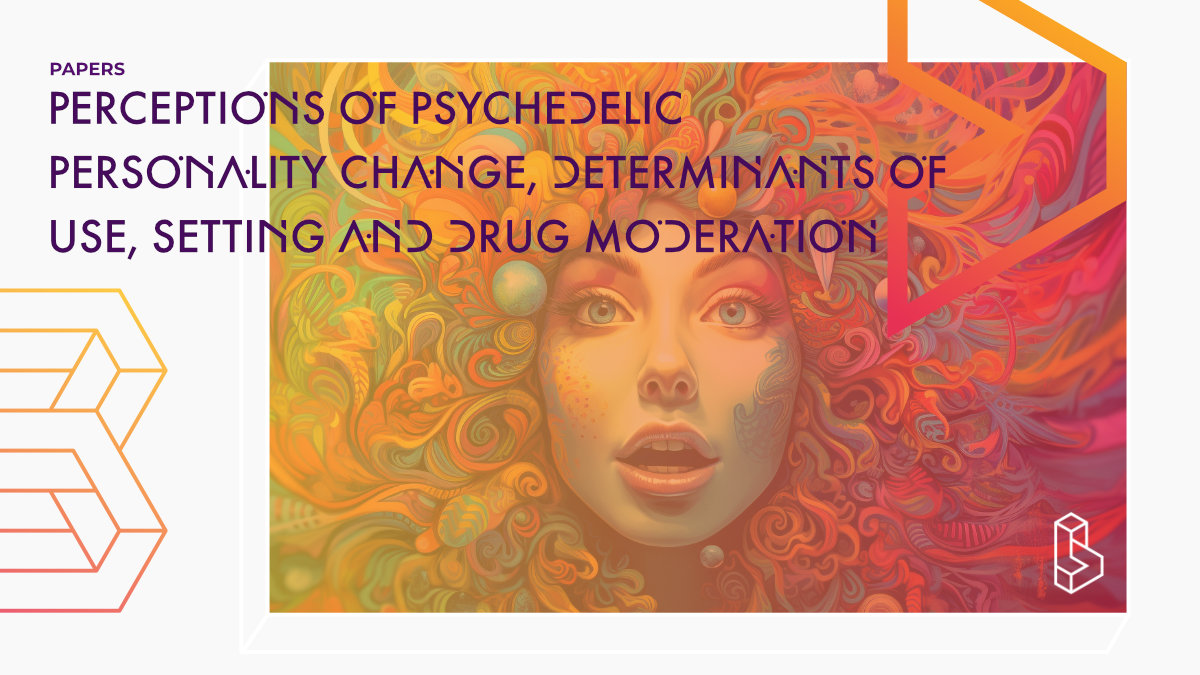This survey (n=426) explores psychedelic-mediated personality changes, identifying 52 unique themes and 8 factors like Unitive Spiritual and Emotional Stability. It finds psychedelic users more open, extraverted, and less neurotic than non-users. The study suggests a model linking personality to psychedelic use and its impact on personality, emphasizing the need for holistic measures in psychedelic-assisted therapeutics.
Abstract of Perceptions of psychedelic personality change, determinants of use, setting and drug moderation
“Background Studies have shown evidence for long-term effects of psychedelics on personality, but comprehensive models of psychedelic-mediated personality changes have yet to be explored.
Aims The present study aims to investigate (1) perceptions of personality change in the general population, (2) moderators of perceived personality change including setting and drug type, and (3) whether personality predisposes individuals to use psychedelics.
Method Paid participants with experience using psychedelic (N = 218), non-users with interest in using psychedelics (N = 104), and non-users without interest in using psychedelic (N = 104) completed an online survey following recruitment from Amazon Mechanical Turk. Psychedelic users were asked to complete written open-ended accounts of perceived personality changes that they attribute to their most intense psychedelic experience. Thematic and factor analyses were undertaken to identify themes of perceived psychedelic change and their organizational structure.
Results/Outcomes Thematic analyses resulted in 52 unique personality change themes, and exploratory factor analyses yielded eight thematic factors (Unitive Spiritual, Gratitude Absorption, Purpose Freedom, Compassion Understanding, Emotional Stability, Openness Perspective, Connection to Self, and Neuroticism Caution). Interest in psychedelic use among non-users was associated with higher openness and neuroticism. Psychedelic users tended to be more open and extraverted, and less neurotic than non-users, and interested non-users tended to be higher in openness than uninterested non-users.
Conclusion/Interpretation The present results inform a tentative model of how personality leads to psychedelic use, how psychedelic use leads to changes in personality, and how setting and drug moderate different types of changes in personality. Research and clinical implications are discussed, including (1) hypotheses for future prospective and experimental research, (2) the value of creating multi-faceted, holistic measures that reflect the diversity and organizational structure of possible psychedelic changes, and (3) the value of allowing such evidence to guide novel psychedelic-assisted therapeutics.“
Authors: Brandon Weiss, Chelsea E. Sleep, Nicholas M. Beller, David Erritzoe & W. Keith Campbell
Summary of Perceptions of psychedelic personality change, determinants of use, setting and drug moderation
Most previous studies have examined the effects of psychedelics using pre-selected outcome measures or have conducted qualitative studies examining areas and processes of change proximal to specific mental health disorders such as depression. The present study aims to generate a model of psychedelic change that integrates disparate aspects of changes in the self.
Evidence of actual change in personality
Cross-sectional and prospective studies suggest that psychedelic compounds accompany meaningful changes in personality, including lower Temperament and Character Inventory (TCI) Harm Avoidance, higher TCI Novelty Seeking, higher TCI Reward Dependence, lower TCI Cooperativeness, higher TCI Self-Tran- scendence, and higher FFM Openness.
Find this paper
https://doi.org/10.1556/2054.2023.00291
Open Access | Google Scholar | Backup | 🕊
Cite this paper (APA)
Weiss, B., Sleep, C. E., Beller, N. M., Erritzoe, D., & Campbell, W. K. (2023). Perceptions of psychedelic personality change, determinants of use, setting and drug moderation: Toward a holistic model. Journal of Psychedelic Studies.

